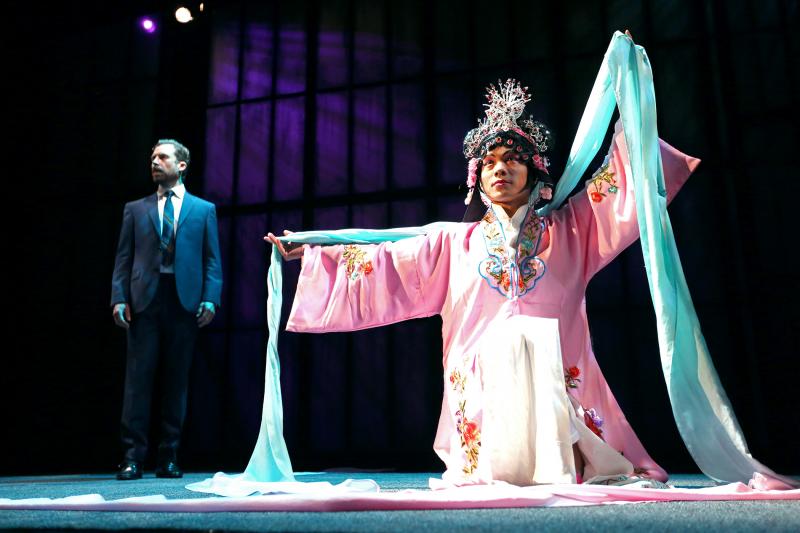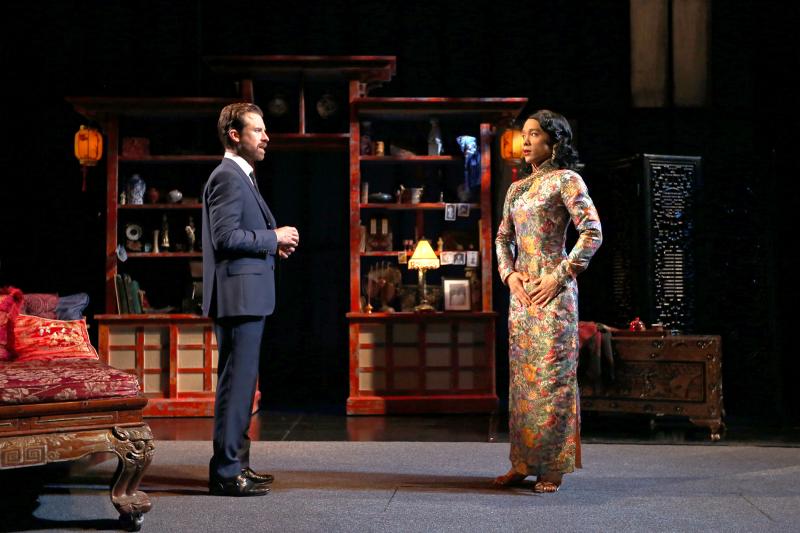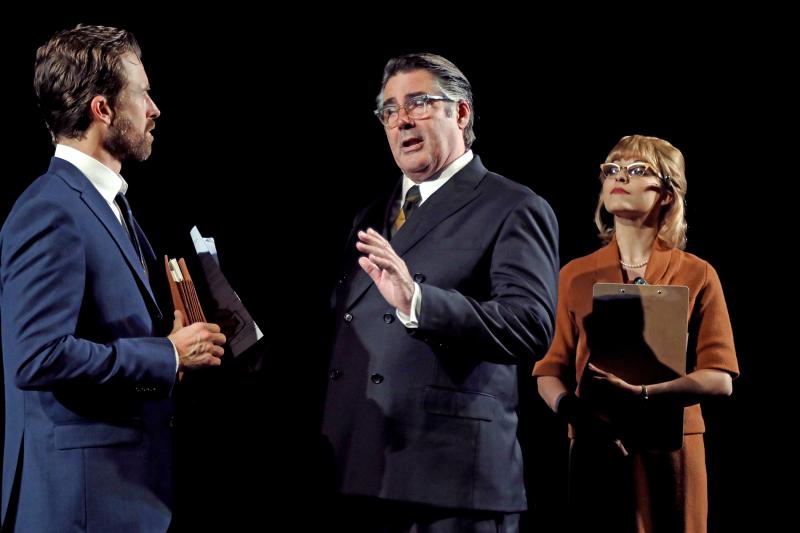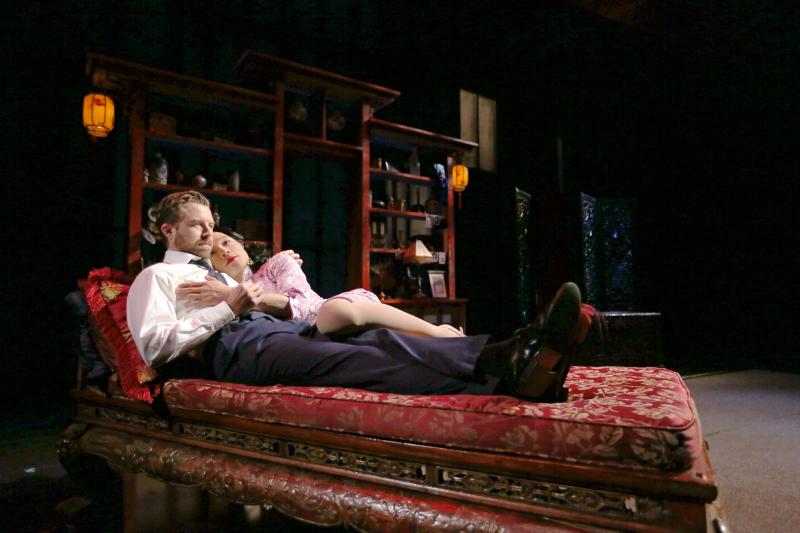Review: Updated M. BUTTERFLY Springs to Life at South Coast Repertory
To close out its 55th season, Orange County's Tony Award-winning South Coast Repertory is mounting David Henry Hwang's intriguing and mysterious play M. BUTTERFLY, using the playwright's much more layered and riveting 2017 Broadway revival as its source material. The original three-act 1988 Broadway production won the Tony Award for Best Play and was a finalist for the Pulitzer Prize.
For this newer, and surprisingly more grounded update---revived for Costa Mesa's regional production that continues through June 8---the play offers a more direct line to its fact-based inspirations, real-life lovers Shi Pei Pu and Bernard Boursicot, as well as a more modern perspective regarding gender and expected gender assignations, alongside its political ramifications, all while still highlighting its hovering relationship to Giacomo Puccini's famous opera Madame Butterfly as well as its abstractly-staged fantastical qualities as the play attempts to examine how people use their outer shells to conceal what truly lies beneath their surface facades.
Marked assuredly by powerful, gripping performances, this admirable OC staging---directed with clarifying precision by Desdemona Chiang---keeps you at the edge of your seat, as it unpacks a story filled with wobbly uncertainties and vague declarations.
That story---told directly towards the audience with palpable bias from a jail cell in 1986, which then springs to life as hazy flashbacks that start from the mid-50's---revolves around married French Diplomat Rene Gallimard (a splendid Lucas Verbrugghe), who, we learn, is assigned a post in Beijing, China. There, he becomes fascinated and then falls madly (emphasis on madly) in love with a gorgeous Chinese opera singer named Song Liling (a stirring Jake Manabat).
One huge problem (or is it?): it appears Rene is unaware that in traditional Chinese operas, every single role---including female roles---are all played by men.
Rene, understandably, is shaken to the core when he sees Song out of his theatrical drag. What happened to the beautiful enchantress that graced the stage?
But when they later engage in more intimate, physical sexual acts, Rene is even more perplexed yet again by Song's seemingly definable/undefinable identity.
He contends with no outward expression of doubt that Song is absolutely female, through and through.
This leads to a torrid affair that, surprisingly enough, lasts 20 years---a long stretch of time that includes Rene returning to France in abject shame after his wife discovers his extramarital activities, and, later, with Song relocating to France herself to become a secret spy for the Chinese government.
The old adage that "ignorance is bliss" definitely plays a huge part in Rene's self delusion, as he surrenders to his deep feelings, throwing all reason and any sort of objectionable review out the window. Pretty soon both Rene and the audience are all unaware of where the truth stops and the fantasy begins. It's the things people do for love, I suppose...
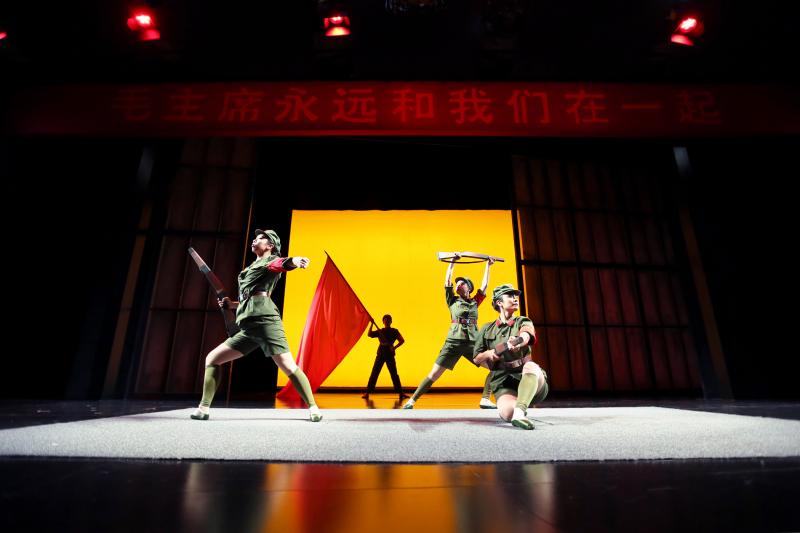
Rene is later charged with treason, and is sent to prison, where we see him presently recounting story---clearly a broken man trapped by his delusions. Is Song the reason he's both heartbroken and a convicted felon?
Which then begs the question that becomes the inescapable elephant in the room: How in the hell did Rene not know Song was a guy?
Perhaps Rene was so in love he didn't care about what's in between Song's legs (or, more plausibly, he didn't want to face the truth). Or, maybe, Song was just that convincing... or because she strongly manipulated and used Rene for her larger, more sinister purposes all along. Throughout the play, gender expectations are often reversed with not so subtle machinations. And Hwang's play purposely doesn't provide all the answers, opting instead to keep things abstract and fluid, just like Song (though, spoiler alert, we do find out a few very, uh, graphic things later in the play).
And much like the play---which hinges on the abstract---so, too, are the play's technical and creative aspects, providing the play with an overarching motif that walls here are as thin as paper or laughably unnecessary... particularly in a world where the people themselves already have their own metaphorical walls built around them. Ralph Funicello's spare but purpose-driven set designs combined with Josh Epstein's methodical lighting designs create spaces and atmospheres that project an eerie balance of delusion and truth mixed with a skewed avant-garde realism. Elsewhere, Sara Ryung Clement's lush costumes provide cultural and time period authenticity while Annie Yee's choreography in unexpected staged "production" numbers provide additional color and theatrical heft.
But it is the play's assembled cast that truly make this play shine. As lovestruck, emotionally traumatized diplomat Rene, Verbrugghe plays his role not with lunacy but with passion, a fragile, bruised man already on the brink caused by history and his general personality. Verbrugghe's exceptional performance truly reiterates his character's unsure footing---is his recollections infected by delusion, blind but strong convictions, or conjured fantasy to mend an aching heart or a bruised ego? His sparring/love partner Song played with mesmerizing ambiguity by Manabat makes for a strong argument as to why Rene is so vehemently enchanted. Manabat feels like an exotic alien with human attributes.
The surprising irony in it all is that Song seems so much more aggressive while Rene is somehow more gentle-which are keenly executed by both actors.
Also worth noting are the production's stellar supporting ensemble (some of whom play multiple roles) which includes Aaron Blakely as Rene's douche-y work friend Marc, offered as a "masculine" contrast but also as an everyday "dude" not ruled by his heart; Melody Butiu as Comrade Chin, Song's Communist professor in the Spy Arts; and Stephen Caffrey as Rene's blowhard of a boss whose holier-than-thou, subtle racism isn't subtle to those of us who endure its kind even today. The cast also features Nike Doukas as Rene's cheated-on wife Agnes and Juliana Hansen as (among others) a "Pin-up girl"---meant to show what white men are supposed to find to be the "ideal" as opposed to the likes of Song. Annika Alejo, Yoko Hasebe, Andres Lagang, and Sophy Zhao also form a four-person dance troupe that enter the play during production numbers.
A beautifully complex production that echoes sentiments of gender conformity/fluidity crossed with geopolitical issues that still resonate in today's ever-changing world, M. BUTTERFLY---particularly with this strong new update instituted by the original playwright himself---is definitely worth seeing.
* Follow this reviewer on Twitter: @cre8iveMLQ *
-----
Photos by Jordan Kubat for South Coast Repertory.
South Coast Repertory presents M. BUTTERFLY by David Henry Hwang. Directed by Desdemona Chiang. Performances continue at South Coast Repertory through June 8, 2019. Tickets can be purchased online at www.scr.org, by phone at (714) 708-5555 or by visiting the box office at 655 Town Center Drive in Costa Mesa.
***
Videos

